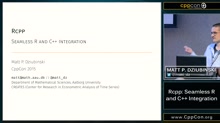C++ Weekly Episode 25: C++17’s Aggregate Initializations—Jason Turner
Episode 25 of C++ Weekly.
C++17's Aggregate Initializations
by Jason Turner
About the show:
In this episode Jason introduces C++17's Aggregate Initializations.
March 11-13, Online
March 16-18, Madrid, Spain
March 23-28, Croydon, London, UK
March 30, Kortrijk, Belgium
May 4-8, Aspen, CO, USA
May 4-8, Toronto, Canada
June 8 to 13, Brno, Czechia
June 17-20, Folkestone, UK
September 12-18, Aurora, CO, USA
November 6-8, Berlin, Germany
November 16-21, Búzios, Rio De Janeiro, Brazil
By Mantosh Kumar | Aug 23, 2016 09:30 PM | Tags: c++17 basics
Episode 25 of C++ Weekly.
C++17's Aggregate Initializations
by Jason Turner
About the show:
In this episode Jason introduces C++17's Aggregate Initializations.
By Marco Arena | Aug 23, 2016 01:26 AM | Tags: visual studio
The Visual Studio Team has introduced five workloads for different C++ development scenarios, whether you are targeting Windows Desktop, Windows Store, or a non-Microsoft platform like Android or Linux:
From the article:
Visual Studio now uses a small standalone application called the Microsoft Visual Studio Installer that manages all installations of Visual Studio 15...
By dan | Aug 22, 2016 11:29 PM | Tags: community
Diego Stamigni (@diegostamigni) recently started a C++ public Slack team.
C++ Public Slack Team
by Diego Stamigni
About the Slack Team
For C++ news and discussion, request an invite.
By Adrien Hamelin | Aug 22, 2016 02:00 PM | Tags: experimental basics
And a second one!
C++17 If statement with initializer
by Steve Lorimer
From the article:
Introduced under proposal P00305r0, If statement with initializer give us the ability to initialize a variable within an
ifstatement, and then, once initialized, perform the actual conditional check.
By Adrien Hamelin | Aug 22, 2016 01:50 PM | Tags: experimental basics
An interesting article about the future!
C++17 Structured Bindings
by Steve Lorimer
From the article:
Introduced under proposal P0144R0, Structured Bindings give us the ability to declare multiple variables initialised from a
tupleorstruct.
By Adrien Hamelin | Aug 22, 2016 01:44 PM | Tags: boost advanced
 Have you registered for CppCon 2016 in September? Don’t delay – Registration is open now.
Have you registered for CppCon 2016 in September? Don’t delay – Registration is open now.
While we wait for this year’s event, we’re featuring videos of some of the 100+ talks from CppCon 2015 for you to enjoy. Here is today’s feature:
Racing The File System
by Niall Douglas
Summary of the talk:
Almost every programmer knows about and fears race conditions on memory where one strand of execution may concurrently update data in use by another strand of execution, leading to an inconsistent and usually dangerous inconsistent read of program state. Almost every programmer therefore is aware of mutexes, memory ordering, semaphores and the other techniques used to serialise access to memory.
Interestingly, most programmers are but vaguely aware of potential race conditions on the filing system, and as a result write code which assumes that the filing system does not suddenly change out from underneath you when you are working on it. This assumption of a static filing system introduces many potential security bugs never mind ways of crashing your program, and of course creating data loss and corruption.
This workshop will cover some of the ways in which filing system races can confound, and what portable idioms and patterns you should employ to prevent misoperation, even across networked Samba shares. Finally, an introduction of the proposed Boost library AFIO will be made which can help application developers writing filing system race free code portably.
By Jon Kalb | Aug 22, 2016 04:43 AM | Tags: None
Video chat:
CppChat 08-21 with Jason and Matt
with Jason Turner, Matt Bentley, and Jon Kalb
From the chat:
We discuss CppCon sessions including Matt's session on the game-friendly containers that he has created and Jason's plenary talk about writing a game for Commodore 64 in C++17, the reprisal of his award-winning C++Now talk on "Practical Performance Practices," and his talk with Rob Irving on their CppCast experiences. Along the way we discuss the history of the 6502 and Stepanov's observation that the STL was not designed with today's hardware in mind.
By Jon Kalb | Aug 21, 2016 11:17 AM | Tags: boost
Video chat:
CppChat 2016-08-14 with Matt and Robert
with Matt Calabrese, Robert Ramey, and Jon Kalb
From the chat:
We discuss Boost, the Boost Incubator, the review process, and the role of Boost in standardization.
By Adrien Hamelin | Aug 19, 2016 02:03 PM | Tags: efficiency community
 Interesting interview:
Interesting interview:
How Bloomberg is Advancing C++ at Scale
by John Lakos
From the article:
John Lakos manages the Bloomberg Development Environment group, which offers a set of C++ software libraries, development tools, and methodology to well over a thousand Bloomberg developers. He is an authority on large-scale C++ software infrastructure, receiving recent acclaim for two publications by Pearson Education on methodology for industrial software development [Part 1, Part 2]. BDE and its libraries are open source and can be found on GitHub. In this conversation, Lakos discusses the importance of instilling process and discipline in all software development projects...
By Adrien Hamelin | Aug 19, 2016 01:52 PM | Tags: performance community
 Have you registered for CppCon 2016 in September? Don’t delay – Registration is open now.
Have you registered for CppCon 2016 in September? Don’t delay – Registration is open now.
While we wait for this year’s event, we’re featuring videos of some of the 100+ talks from CppCon 2015 for you to enjoy. Here is today’s feature:
Rcpp: Seamless R and C++ Integration
by Matt P. Dziubinski
Summary of the talk:
R is an open-source statistical language designed with a focus on data analysis. While its historical roots are in statistical applications, it is currently experiencing a rapid growth in popularity in all fields where data matters: from data science, through bioinformatics and finance, to machine learning. Key strengths contributing to this growth include its rich libraries ecosystem (over 6 thousands packages at the moment of writing) – often authored by the leading researchers in the field, providing early access to the latest techniques; beautiful, high-quality visualizations – supporting seamless exploratory data analysis and producing stunning presentations; all of this available in an interactive environment resulting in high productivity through fast iteration times.
At the same time, there are no free lunches in programming: the dynamic, interactive nature of R does have its costs, including a significant impact on run-time performance. In an era of growing data sizes and increasingly realistic models this concern is only becoming more important.
In this talk we provide an introduction to Rcpp – a library allowing smooth integration of R with C++, combining the productivity benefits of R for data science together with the performance of C++. First released in 2005, today it’s the most popular language extension for R -- used by over 400 packages. We'll also discuss challenges (as well as possible solutions) involved in integrating modern C++ code, and demonstrate the usage of popular C++ libraries in practice. We’ll conclude the talk with the RInside package allowing to embed R in C++.